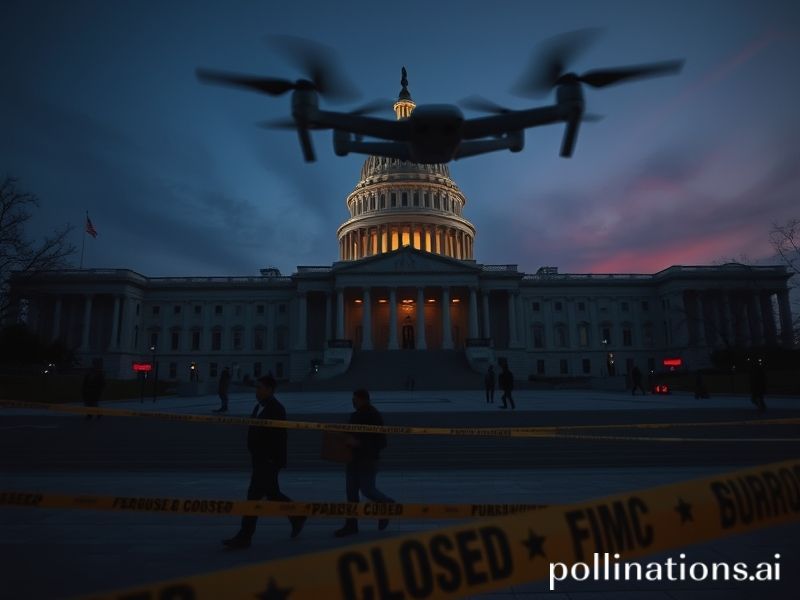Global Schadenfreude as America Locks Its Own Doors: Inside the 2025 Federal Shutdown Fallout
Brussels, 11 October 2025 – While most of the planet was busy arguing about whether the Atlantic hurricane season should be renamed “the Atlantic revenge tour,” the United States once again locked its own front door and threw the keys into the Potomac. The federal government shutdown of 2025—number six in the “Shutdown Cinematic Universe” and arguably the one with the weakest plot—began at 12:01 a.m. Eastern Standard Tantrum Time. Statistically, it affects 2.2 million federal employees and, spiritually, every foreign observer who once believed the “grown-up superpower” narrative.
Overseas, the reaction has been a cocktail of Schadenfreude, spreadsheet anxiety, and déjà vu. In Berlin, Finance Minister Lena Krause opened her emergency PowerPoint titled “When Your Hedge Fund Uncle Forgets to Pay the Electric Bill,” reminding legislators that 34 % of German pharmaceutical exports rely on FDA sign-offs now parked behind a furlough. Tokyo’s Nikkei flickered crimson as algorithmic traders—trained on the quaint notion that Washington eventually stops punching itself—finally coded a “perpetual pratfall” scenario. Meanwhile, in Nairobi, mobile-money executives joked that while America experiments with anarcho-bureaucracy, Kenya has at least mastered paying its civil servants via M-Pesa on time. The laughter was only slightly bitter.
The immediate international casualties are the usual diplomatic extras: visa backlogs that make Kafka look concise, climate satellites drifting unsupervised like teenagers after curfew, and the Pentagon’s habit of sending very polite emails to allied militaries reading, “Exercise postponed; please don’t invade anything until further notice.” NATO planners in Mons, Belgium, have begun color-coding contingency schedules: green for functional, amber for American tantrum, red for “maybe we should ask the Swedes to host the AWACS this year.”
Global markets, those finely tuned hysterics, have responded by pricing in a new risk premium labeled “US Governance Beta.” The premium is measured in basis points and eye-rolls. Analysts at Société Générale now include a footnote on every Treasury report: “Assumes Congress remembers what Congress is.” In London, gilt traders toast their American cousins with lukewarm ale: “May your gridlock be our safe haven.”
The broader significance is less comic. The shutdown has become a recurring advertisement for the post-American order nobody really wanted but everybody quietly prepared. China’s Belt and Road Initiative just gained a fresh talking point: “We build bridges, not shutdowns,” a slogan printed on glossy pamphlets distributed at every port from Piraeus to Punta Arenas. The European Union, still dizzy from enlargement negotiations with the Western Balkans, has accelerated plans for a euro-denominated derivatives clearing house—part financial prudence, part therapy for transatlantic PTSD.
Emerging economies watch with the morbid curiosity usually reserved for Formula 1 crashes. Brazil’s central bank governor, sipping açaí-spiked espresso, mused that America’s debt ceiling is “the only ceiling Brazilians have never painted.” India’s space agency, fresh from another lunar triumph, offered—only half in jest—to lease spare bandwidth to NASA’s darkened Deep Space Network, provided payment is made in rupees, land on the moon, or unconditional TikTok shares.
Back in the States, federal park rangers—now unpaid Uber drivers—greet tourists with laminated cards explaining that Old Faithful still erupts, but the gift shop is closed so “please imagine your own refrigerator magnet.” At international airports, Customs officers stamp passports with the enthusiasm of actors forced to improvise after the playwright walked offstage. The TSA, meanwhile, innovated: passengers may now opt to screen themselves “for the sense of empowerment.”
Conclusion: The 2025 shutdown is less an American crisis than a global mirror. It reminds allies that reliability is a subscription service the U.S. keeps forgetting to auto-renew. It reassures adversaries that chaos is bipartisan and exportable. And it confirms what cynics from Caracas to Canberra already knew: the indispensable nation has become the intermittently functional one. Until the next funding bill passes—probably at 3 a.m., attached to a resolution declaring National Pickle Month—the world will keep calm, hedge in euros, and quietly update its emergency contact list. After all, when the lighthouse starts flickering, even the lighthouse keeper’s friends bring their own flashlights.







